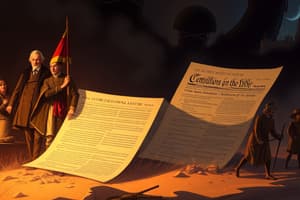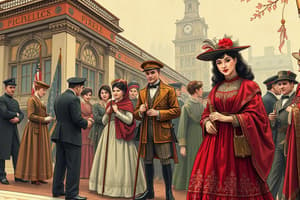Podcast
Questions and Answers
What was the central aim of the Progressive Movement?
What was the central aim of the Progressive Movement?
- Stimulating the growth of large-scale industrial conglomerates.
- Rectifying societal inequalities and reforming governmental processes. (correct)
- Expanding American territorial possessions overseas.
- Augmenting the capabilities of the armed forces.
Which constitutional amendment provided for the direct election of United States Senators by the electorate?
Which constitutional amendment provided for the direct election of United States Senators by the electorate?
- 17th Amendment (correct)
- 18th Amendment
- 19th Amendment
- 16th Amendment
Who spearheaded the settlement house movement in the United States, establishing Hull House as a focal point for community assistance and reform?
Who spearheaded the settlement house movement in the United States, establishing Hull House as a focal point for community assistance and reform?
- Ida B. Wells
- Jane Addams (correct)
- Carrie Chapman Catt
- Alice Paul
What issue was Upton Sinclair’s novel, The Jungle, principally focused on?
What issue was Upton Sinclair’s novel, The Jungle, principally focused on?
During the Progressive Era, what did the term 'muckraker' specifically denote?
During the Progressive Era, what did the term 'muckraker' specifically denote?
What specific issue did the 18th Amendment to the United States Constitution address?
What specific issue did the 18th Amendment to the United States Constitution address?
What was the name given to Theodore Roosevelt’s comprehensive domestic policy agenda?
What was the name given to Theodore Roosevelt’s comprehensive domestic policy agenda?
Which regulatory agency was established during the Progressive Era with the mandate to prevent unfair business practices and promote fair competition in the marketplace?
Which regulatory agency was established during the Progressive Era with the mandate to prevent unfair business practices and promote fair competition in the marketplace?
What pivotal event or factor led to the enactment of the Pure Food and Drug Act?
What pivotal event or factor led to the enactment of the Pure Food and Drug Act?
Which fundamental political reforms gained prominence during the Progressive Era, empowering citizens with greater control over legislation?
Which fundamental political reforms gained prominence during the Progressive Era, empowering citizens with greater control over legislation?
Which event served as the immediate catalyst for the outbreak of World War I?
Which event served as the immediate catalyst for the outbreak of World War I?
In what year did the United States officially enter World War I, joining the Allied forces against the Central Powers?
In what year did the United States officially enter World War I, joining the Allied forces against the Central Powers?
What was the fundamental purpose of the Espionage and Sedition Acts enacted during World War I?
What was the fundamental purpose of the Espionage and Sedition Acts enacted during World War I?
What key principle or proposal was included in President Woodrow Wilson’s Fourteen Points?
What key principle or proposal was included in President Woodrow Wilson’s Fourteen Points?
Which nation was assigned the primary responsibility for causing World War I under the terms of the Treaty of Versailles?
Which nation was assigned the primary responsibility for causing World War I under the terms of the Treaty of Versailles?
Why is the decade of the 1920s often referred to as the Roaring Twenties?
Why is the decade of the 1920s often referred to as the Roaring Twenties?
What was the underlying cause that significantly contributed to the emergence and flourishing of the Harlem Renaissance?
What was the underlying cause that significantly contributed to the emergence and flourishing of the Harlem Renaissance?
Which characteristic was most indicative of the economic landscape in the 1920s?
Which characteristic was most indicative of the economic landscape in the 1920s?
Which constitutional amendment secured women's right to vote in the United States?
Which constitutional amendment secured women's right to vote in the United States?
What fundamental conflict was brought to the forefront during the Scopes Trial?
What fundamental conflict was brought to the forefront during the Scopes Trial?
What was the primary source of fear during the Red Scare of the 1920s?
What was the primary source of fear during the Red Scare of the 1920s?
What unintended consequence arose from the Prohibition era in the United States?
What unintended consequence arose from the Prohibition era in the United States?
What was the main objective of the Kellogg-Briand Pact?
What was the main objective of the Kellogg-Briand Pact?
Who was a prominent figure in the jazz music scene during the 1920s?
Who was a prominent figure in the jazz music scene during the 1920s?
Which technological advancement significantly revolutionized American life during the 1920s?
Which technological advancement significantly revolutionized American life during the 1920s?
What critical event is widely recognized as the starting point of the Great Depression in the United States?
What critical event is widely recognized as the starting point of the Great Depression in the United States?
Flashcards
Progressive Movement Goal?
Progressive Movement Goal?
To address social injustices and reform government in the United States.
17th Amendment?
17th Amendment?
Established the direct election of U.S. Senators by the people.
Who was Jane Addams?
Who was Jane Addams?
A key leader of the settlement house movement; founded Hull House in Chicago.
The Jungle's Subject?
The Jungle's Subject?
Signup and view all the flashcards
Who were the 'Muckrakers'?
Who were the 'Muckrakers'?
Signup and view all the flashcards
18th Amendment?
18th Amendment?
Signup and view all the flashcards
What was the 'Square Deal'?
What was the 'Square Deal'?
Signup and view all the flashcards
Federal Trade Commission (FTC)?
Federal Trade Commission (FTC)?
Signup and view all the flashcards
Pure Food and Drug Act?
Pure Food and Drug Act?
Signup and view all the flashcards
What were Progressive Era political reforms?
What were Progressive Era political reforms?
Signup and view all the flashcards
WWI Trigger?
WWI Trigger?
Signup and view all the flashcards
When did the U.S. enter WWI?
When did the U.S. enter WWI?
Signup and view all the flashcards
Espionage and Sedition Acts?
Espionage and Sedition Acts?
Signup and view all the flashcards
League of Nations?
League of Nations?
Signup and view all the flashcards
Treaty of Versailles' Blame?
Treaty of Versailles' Blame?
Signup and view all the flashcards
Why 'Roaring Twenties'?
Why 'Roaring Twenties'?
Signup and view all the flashcards
Harlem Renaissance Cause?
Harlem Renaissance Cause?
Signup and view all the flashcards
1920s Economy?
1920s Economy?
Signup and view all the flashcards
19th Amendment?
19th Amendment?
Signup and view all the flashcards
Scopes Trial?
Scopes Trial?
Signup and view all the flashcards
Red Scare of 1920s?
Red Scare of 1920s?
Signup and view all the flashcards
Prohibition Era?
Prohibition Era?
Signup and view all the flashcards
Kellogg-Briand Pact?
Kellogg-Briand Pact?
Signup and view all the flashcards
Who was Duke Ellington?
Who was Duke Ellington?
Signup and view all the flashcards
1920's Innovation?
1920's Innovation?
Signup and view all the flashcards
Study Notes
- Study notes on multiple-choice test questions about the Progressive Era, World War I and the Roaring Twenties and the Great Depression.
The Progressive Era (1890–1913)
- The primary goal of the Progressive Movement was to address social injustices and reform government.
- The 17th Amendment established the direct election of U.S. Senators.
- Jane Addams was a key leader of the settlement house movement and founded Hull House.
- Upton Sinclair’s novel The Jungle was primarily about the meatpacking industry.
- "Muckraker" refers to journalists exposing societal issues.
- The 18th Amendment to the Constitution dealt with the prohibition of alcohol.
- Theodore Roosevelt’s domestic policy was known as the Square Deal.
- The Federal Trade Commission (FTC) was created to regulate unfair business practices during the Progressive Era.
- The Pure Food and Drug Act was passed as a result of Upton Sinclair’s The Jungle.
- The Progressive Era saw the rise of political reforms such as initiative, referendum, and recall.
World War I and the Roaring Twenties (1914–1929)
- The assassination of Archduke Franz Ferdinand triggered the start of World War I.
- The United States entered World War I in 1917.
- The purpose of the Espionage and Sedition Acts during World War I was to suppress dissent and criticism of the war effort.
- President Woodrow Wilson’s Fourteen Points included a call for a League of Nations.
- The Treaty of Versailles placed primary blame for World War I on Germany.
- The 1920s are often referred to as the Roaring Twenties because economic prosperity and cultural change flourished.
- The main cause of the Harlem Renaissance was the migration of African Americans to Northern cities.
- Primary characteristic of the 1920s economy was rapid industrial growth and stock market speculation.
- The 19th Amendment granted women the right to vote.
- The Scopes Trial highlighted the conflict between religious fundamentalism and modern science.
- The Red Scare of the 1920s was primarily a fear of Communist influence in the United States.
- The Prohibition era gave rise to speakeasies and bootlegging.
- The purpose of the Kellogg-Briand Pact was to outlaw war as a tool of national policy.
- Duke Ellington was a leading figure in jazz music during the 1920s.
- The assembly line innovation transformed American life during the 1920s.
The Great Depression (1929–1940)
- The stock market crash of 1929 marked the start of the Great Depression.
- A primary cause of the Great Depression was overproduction and unequal wealth distribution.
- President Franklin D. Roosevelt is most closely associated with the New Deal.
- The purpose of the Civilian Conservation Corps (CCC) was to provide jobs in environmental conservation.
- The Social Security Act provided unemployment insurance, old-age pensions, and aid to the disabled.
- The Dust Bowl primarily affected the Great Plains.
- The Wagner Act guaranteed the right of workers to unionize and bargain collectively.
- The goal of the Tennessee Valley Authority (TVA) was to provide electricity to rural areas.
- "Hoovervilles" were shantytowns for the homeless.
- A criticism of Franklin D. Roosevelt’s New Deal was that it expanded government power too much.
- The term "fireside chats" refers to speeches given by Franklin D. Roosevelt to calm and inform Americans.
- The Securities and Exchange Commission (SEC) was created to regulate the stock market.
- The Hawley-Smoot Tariff raised tariffs on foreign goods, worsening the Great Depression.
- A "bank holiday" during the Great Depression was a temporary closure of banks to prevent collapses.
- Eleanor Roosevelt was known for advocating for women’s and civil rights.
- The Works Progress Administration (WPA) focused on creating jobs in public works projects.
- The "court-packing plan" referred to Franklin D. Roosevelt’s attempt to add more justices to the Supreme Court.
- The Grapes of Wrath captured the struggles of Dust Bowl migrants.
- The Dust Bowl was caused by over-farming and drought.
- The Federal Deposit Insurance Corporation (FDIC) was created to ensure bank deposits.
- The New Deal coalition included all groups except big business leaders.
- The start of World War II helped end the Great Depression.
- The main goal of the Agricultural Adjustment Act (AAA) was to raise crop prices by limiting production.
- A key feature of the Second New Deal was greater support for social welfare programs.
- Franklin D. Roosevelt served as president for four terms.
Studying That Suits You
Use AI to generate personalized quizzes and flashcards to suit your learning preferences.




